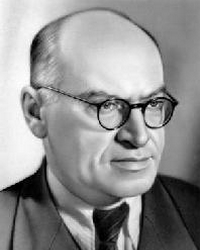 |
Prof. YAKOV I. FRENKEL
|
Prof. Yakov I. Frenkel was born in southern Russian city Rostov-on-Don. In 1912, while studying in the Karl May Gymnasium in St. Petersburg, he finished his first work in physics on the earth's magnetic field and atmospheric electricity, wrote a 100-page mathematical paper that rediscovered many results of the calculus of finite differences. He was admitted to St. Petersburg University in the winter semester of 1913 and graduated in 3 years.
From 1921 till the end of his life, Frenkel worked at the Physico-Technical Institute. Beginning in 1922, he published a book virtually every year. In 1924 he published 16 papers (of which 5 were basically German translations of his other publications in Russian), three books, and edited multiple translations. In 1926 Frenkel introduced the key idea of defects of crystalline structure. He showed that the “evaporation” of atoms (or ions) from their equilibrium states occurred under finite temperature and introduced the idea of moving holes that could propagate through crystals independent of the movement of the atom that left it. These defects are known as Frenkel defects. His work in solid and liquid state physics is considered to be the golden foundation of twentieth-century physics. Best known are the Frenkel pairs (defects), kinetic theory of liquids, the theory of mobile dislocations (Frenkel- Kontorova solitons). Today, the electron theory of solids is inconceivable without excitons - the quasiparticles he introduced in 1930. Frenkel also contributed important concepts to classical electrodynamics (which now go under Feynman‘s appellation "Frenkel‘s Fields") and to nuclear physics (the Bohr-Frenkel drop model).
Frenkel was honored, along with other scientists, with the Labor Red Banner Order. Two years later, his Kinetic Theory of Liquids was awarded the First Grade State Prize. Frenkel’s work was greatly affected and his health deteriorated toward the end of his life. He died in 1952, not quite 58 years old.
Taken from Yakov Ilich Frenkel: His Work, Life and Letters by Victor Ya. Frenkel,The Physics Today, Volume 47, Issue 6 (1994)